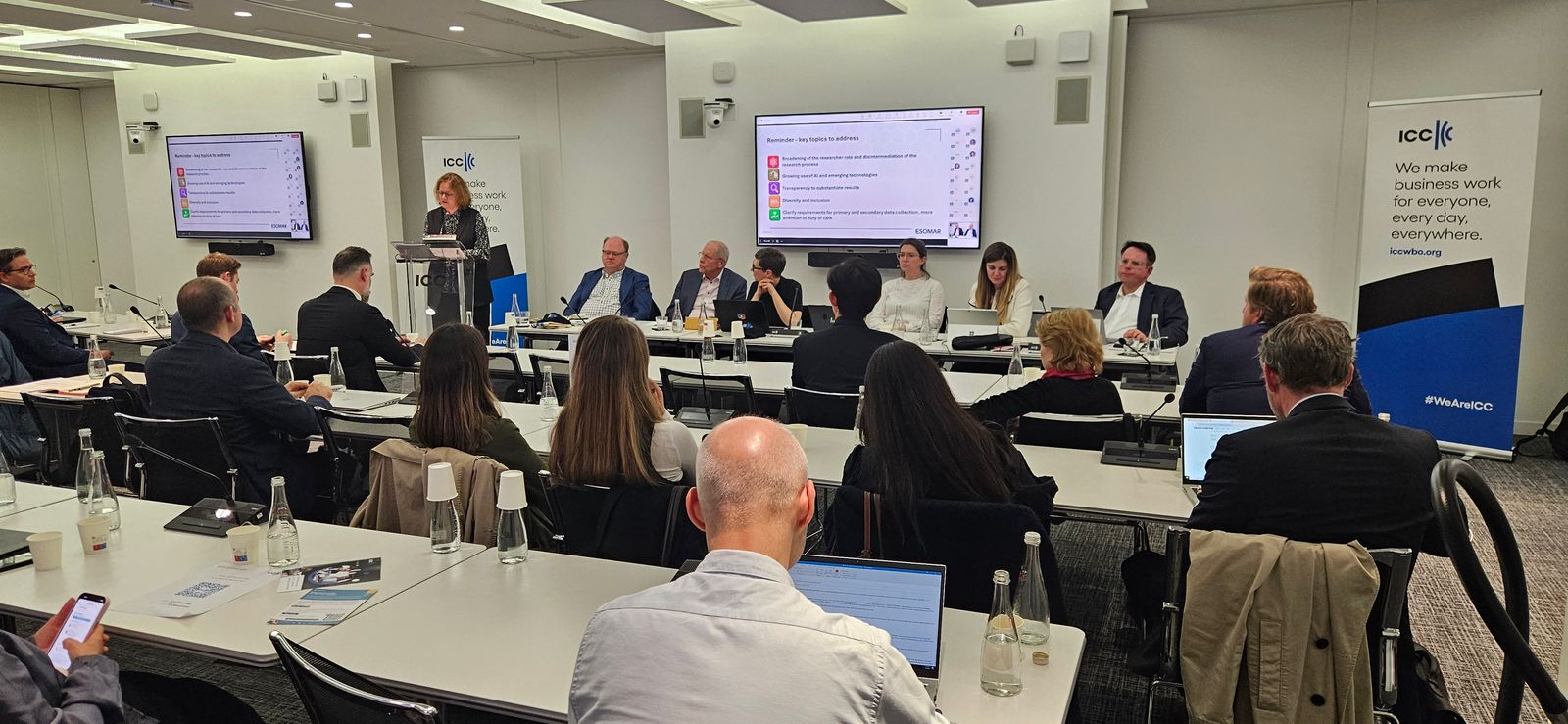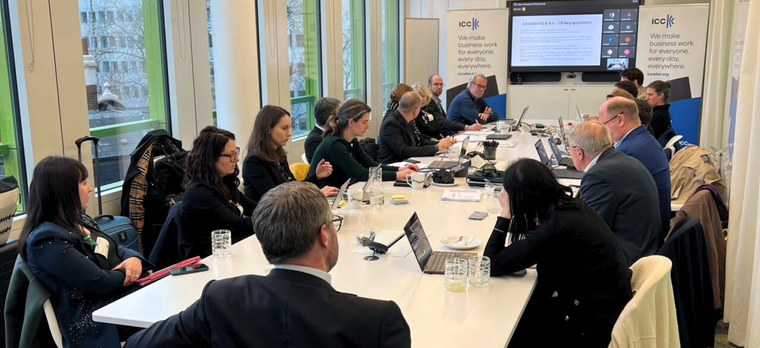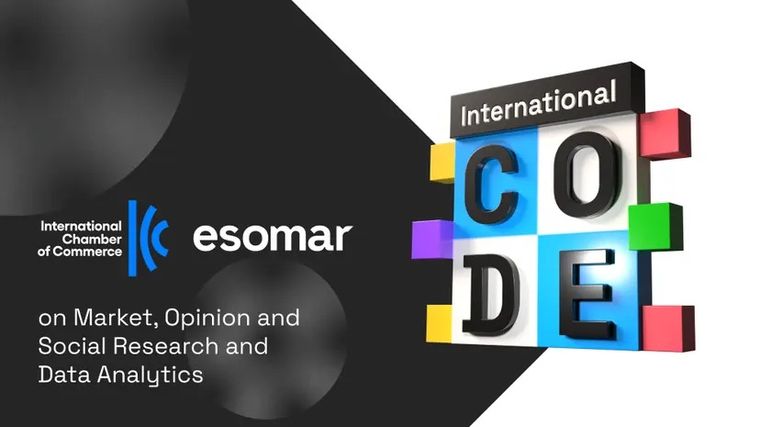Safeguarding Trust in the Age of AI: Why a Revised Code of Conduct Matters for Our Industry
ESOMAR met at the ICC in Paris with over 50 attendees to discuss the future of marketing and celebrate the launch of the ICC Marketing and Advertising Code of Conduct.

ESOMAR had the privilege of gathering at the International Chamber of Commerce (ICC) headquarters in Paris for a vital and timely conversation on the future of marketing, advertising, and insights. With over 50 attendees, the day opened with a moment of celebration, showing the first printed edition of the ICC Marketing and Advertising Communications Code of Conduct, newly translated into Thai, marking its global relevance.
But the core of the meeting, however, was not only about celebration; it was about evolution.
Throughout the day, the different commission members presented updates across several major workstreams that will shape the future of ethical communications. These included responsible use of AI in advertising, environmental marketing, alcohol-related messaging, and protections for children and teens. And it was amid these updates that ESOMAR had the opportunity to shine the spotlight on the research activity by summarising the highlights of the revision of the ICC/ESOMAR International Code on Market, Opinion and Social Research and Data Analytics. Already in its last round of consultation, ESOMAR members will vote to approve the text in the upcoming Annual General Meeting on 12 June.
A Shared Responsibility for Ethical Innovation
Anders Stenlund, ICC Representative and Managing Partner at AB Stencia, opened by recognising the Code Revision Team’s hard work and the deep expertise of ESOMAR members who have contributed to the process before giving Judith Passingham the lead. Judith, Chair of the Professional Standards Committee at ESOMAR, then outlined how, two years ago, ESOMAR launched a wide-ranging consultation within the industry, gathering input on how our professional landscape is changing and how our foundational Code should in turn keep up.
Today, those changes are undeniable, and the research function is no longer the one-stop shop that controls every step of the process including data collection, the design of methodologies and the interpretation of analysis. Instead, these are offered by differentiated and specialised companies, giving brands fuller control and autonomy to internalise the process. Of course, this comes with increased responsibility for these internal teams, who now need to concern themselves with privacy compliance issues, managing AI systems, and collaborating in real-time with their providers. The line between client and researcher, therefore, has blurred. Self-service platforms, synthetic data, multiple sample sources, and AI-driven deliverables are all part of a new normal. ESOMAR’s ethical guidance must reflect this reality.
From Disintermediation to Inclusion
The revised text of the ICC/ESOMAR Code of conduct addresses several key areas, such as:
Disintermediation: As the traditional end-to-end research model fragments, we need shared ethical ground, no matter who leads each stage of a project.
Emerging Technologies: With the rise of AI and synthetic data, transparency and accountability are more important than ever.
Diversity and Inclusion: Research must reflect adequately the diverse characteristics of the populations it studies.
Primary and Secondary Data: Clear guidance was needed to navigate increasingly complex data ecosystems.
Duty of Care: Researchers have a responsibility, not only to clients, but also to participants, the public, and the profession itself.
Why Self-Regulation Still Matters
In an era of increasing scrutiny on how data is collected and used, the need for self-regulation is greater than ever. A Code of Conduct is not just a document, it’s a tool for safeguarding trust. It shows that, as an industry, researchers and analysts are willing and able to hold ourselves to high standards. It also allows the industry to stay flexible and forward-looking in ways regulation alone often cannot. In the words of former European Commissioner for Justice Didier Reynders, "legislation alone cannot solve all our problems. […] Let me reaffirm that I see both regulatory and self-regulatory instruments as complementary to each other"
ESOMAR’s role is to champion this balance: fostering innovation while ensuring integrity. By aligning with the ICC and participating in these multi-sector conversations, we are anchoring research and data analytics within a broader framework of responsible communication.
As we look ahead to the public release of the revised ICC/ESOMAR International Code on Market, Opinion and Social Research and Data Analytics, we invite everyone in the insights ecosystem, from researchers to data scientists, from agencies to in-house teams, to engage with it. Read it. Share it. Use it.
It is, after all, a Code for all of us.
Xabier Palacio
Head of Intelligence, Advocacy and Standards at EsomarXabier guides the creation of influential studies, reports, and guidelines at ESOMAR while overseeing the Departments of Professional Standards, Intelligence, and Public Affairs. He leads efforts to provide industry insights, maintain ethical standards, and advocate for the sector’s interests. ESOMAR, a global hub for research, insights, and analytics since 1947, supports over 50,000 professionals and companies worldwide. Under Xabier’s leadership, these departments ensure the industry’s continued growth, fostering collaboration and advocating for responsible practices with regulators and legislators.
Originally from Spain, Xabier has been living in the Netherlands for a number of years, where he studied a Master in International Economics followed by a Master in Marketing at the Erasmus University of Rotterdam. He is fluent in Spanish and English, has a decent command of Dutch, and loves music about as much as analysis.

